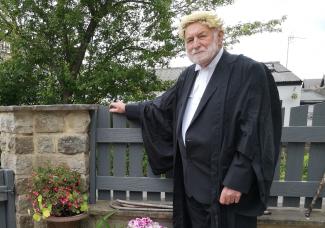The wonder of life

Tony Thorndike's experiences of stammering in his formative years will be familiar to many. Yet he went on to become a teacher, then a professor, and via a career change in his 50s, a barrister and even a judge. Now retired, Tony looks back on his varied working life and shares his secrets for developing self-confidence.
Everybody is different, aren't they? In my journey through life I have shared fellow stammerers' ups and downs but the impact of a stammer, and how we as individuals cope with it, is far from uniform. There is no fancy algorithm to assist.
As a child I stammered badly and, as I grew older, the telephone in particular was an object of fear. You know the story: being taunted in the classroom and, worse, at parties; sometimes being laughed at by a teacher when trying to articulate an answer when knowing perfectly well what the answer was; and trying desperately to find fluency through using alternative words. I had no interest in football or cricket so social acceptance was even more restricted. Fortunately, I was good at athletics and long-distance running, which boosted social confidence.
Against this environment, I struggled to express my personality. I am naturally outgoing but was forced into shyness, which only made matters worse.
I can look back on a working life dominated by challenges and active responses. And I don't regret a minute of it.
And yet not only did I become a university teacher, culminating in a professorship, but then — taking up a second career in my early 50s — became a barrister and a judge!
How did that happen?
It is easy to say it was down to determination. We can all say that. In my case it was about boosting self-confidence and self-respect. Although I came to it more by accident than by design, I learnt in my late teenage years to meditate and to develop mindful calmness through breathing techniques. That however wasn't enough.
During my university years, besides participating in social life, I forced myself to contribute as much as possible in seminars. The key, I found, was preparation, preparation, preparation. As my analytical skills developed, the focus was on the questioning of assumptions and generating questions, taking care to ensure a degree of credibility. I also taught myself to look at people, no matter who they were, straight in the eye when conversing with them. And to continue holding that pose till the end of the conversation.
Self-confidence came in spades, to say nothing of self-respect. It was not long before I realised how lucky I was. Telling friends and colleagues this became common, reinforcing fluency.
Knowing what I wanted to say in a calm manner, without panicking, not only boosted my self-confidence — both psychologically and socially — but also prompted me to volunteer to make presentations, what later were to be lectures as I embarked on an academic career. Making full use of hand (and body) movements to emphasise a point helped fluency. And using anecdotes laced with a few jokes (Tommy Cooper was a good source!), all appearing to be spontaneous but actually carefully rehearsed, worked wonders. All this was put over in a calm manner with a half smile on my face. Treating people courteously was another tool. Not only is that important in its own right, it also encouraged people to want to hear what I had to say.
Hobbies
Another important element was the opportunity to develop hobby-based expertise. From my earliest days I have been interested in railways. As steam operated heritage railways began to develop, I became an active volunteer. I remain a fully qualified, and working, guard. Another absorbing hobby was — and still is — maps and cartography, developing a specialist knowledge.
Self-confidence came in spades, to say nothing of self-respect. It was not long before I realised how lucky I was. Telling friends and colleagues this became common, reinforcing fluency. If I lapsed, I joked about it.
Preparation
There was of course a price. Preparation, whether it be for a university lecture, a legal argument to be made in court or keeping train passengers happy, demands time. In both careers, it was not uncommon for me to work up to 60 hours a week, if not more, to the dismay of the family. It was not that I was a workaholic as some people thought I was. It was simply the need to prepare and thus be self-confident.
Fortunately, I had a wonderfully supportive wife, sadly no longer with me, and three happy self-confident children. A firm family foundation underpinning any life has inestimable value. Another foundation was embracing Buddhism, which stresses peace and well-being with no theological hang ups.
Now I am retired (aged 78), I can look back on a working life dominated by challenges and active responses. And I don't regret a minute of it: not many of we stammerers have had the chance to have very interesting careers, let alone careers involving a lot of public speaking. And always delivered with that half smile.
Would you like to share your story? See Submit Something For The Site or email editor@stamma.org or details.

































